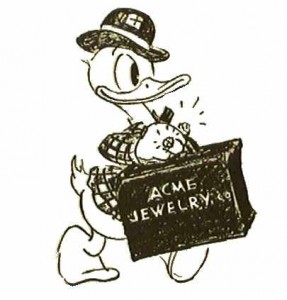In the 1980s I cut my Direct Marketing teeth under the tutelage of Hank Johnson and Katie Muldoon, two of the giants of the catalog world. My previous business experience had been entertainment booking and promotion. Marketing in the entertainment world in those days was a rather blunt instrument. It just wasn’t difficult to get someone to a Heart or Prince concert, or to a major Hollywood preview. What I understood about marketing was wining and dining and printing billboards.
We were starting a catalog that sold videos to consumers at a time when consumers didn’t purchase video unless it was a Jane Fonda workout. Blockbuster still had less than five stores, there was a video rental store on nearly every corner, and people waited in line on Friday afternoons to rent their weekend entertainment and return it by Sunday.
My primary responsibility was merchandising, and as it turned out, I had a lot to learn.
Early on a salesman came asking for me with a suitcase full of samples. He didn’t have an appointment and I didn’t know who he was, so I asked the receptionist to send him away with instructions to call for an appointment. We were one day away from a major print deadline and I was buried in final proofs.
The next thing I knew, my boss came through my office door with the salesman in tow. My boss proceeded to lecture me on the fact that if Lillian Vernon could sit on the back of a donkey cart traveling through China in 1972* to build the world’s most successful direct merchant, I could sure as hell take an uninvited salesperson in and see what he had to say.
Later, after making it through the sales call in spite of my shame and fury, I went to my boss. I was pretty tweaked. He’d embarrassed me. So I asked him, “How am I supposed to get anything done if I have to receive every salesperson who decides to drop by without an appointment?”
To which he replied, “How do you expect to be a successful merchant if you don’t live and breathe with the one goal of finding the most interesting, most relevant, most desirable products for your customers? Nothing else we do matters if we don’t get the products right!”
I had made the mistake of thinking that I knew how to merchandise movies and music just because I knew the output of the movie and music studios better than almost anyone. But understanding a product category – even loving a product category - is not the same as merchandising a product category. Eventually I would learn that being an expert on a product is primarily about the self. Being a merchant is about the customer; her wants, her needs, her expectations, and all the other things in the market that are vying for her attention.
So I became a student of Lillian Vernon. How she analyzed everything she offered for sale and the types of women who bought from her. How she honed her offering over time to thoughtfully satisfy needs her customers didn’t even know they had. How she was always scouting for something her clients hadn’t seen before and could get excited about. How she never sat on products that didn’t sell, but cut her losses and moved on quickly so as not to waste time on merchandise that was diminishing her brand and wasting precious catalog space. How she carefully managed the balance between evergreen products and new products so as never to become stale. How she established powerful relationships with vendors based on mutual trust and respect to ensure she always saw the most exciting products first. Lillian Vernon knew that the only way to keep her customers was to make sure they were excited just thinking about receiving a new catalog in the mail each month.
A recent commenter on one of my blogs noted that many of the companies today cannot change because of their fixed structures. Never mind that failure to change is the same as failure to survive. If a company is passionate about its merchandising; if a company is constantly taking the temperature of its customers and analyzing customer behavior; if a company is always testing new ideas, ditching the weak ones and building on the strong ones, that company can’t help but change. Outstanding merchandising is one of the pillars of business success.
Even Campbell’s Soup has had to constantly change throughout the years to reflect changing consumer tastes and expectations. If a product category as basic as soup must change to stay relevant, how much more important is the constant search for relevance to a company that sells non-essential goods?
Today the company Lillian Vernon has changed hands several times and is no longer what it once was. But Lillian Vernon the merchant, the intrepid explorer for products that would delight her customers and make her money, is still a strong role model for me. I hope she can inspire you too.
*I was never able to verify that Lillian Vernon ever rode a donkey cart in China, though she was one of the first business people to do trade there after Nixon's historic visit.











